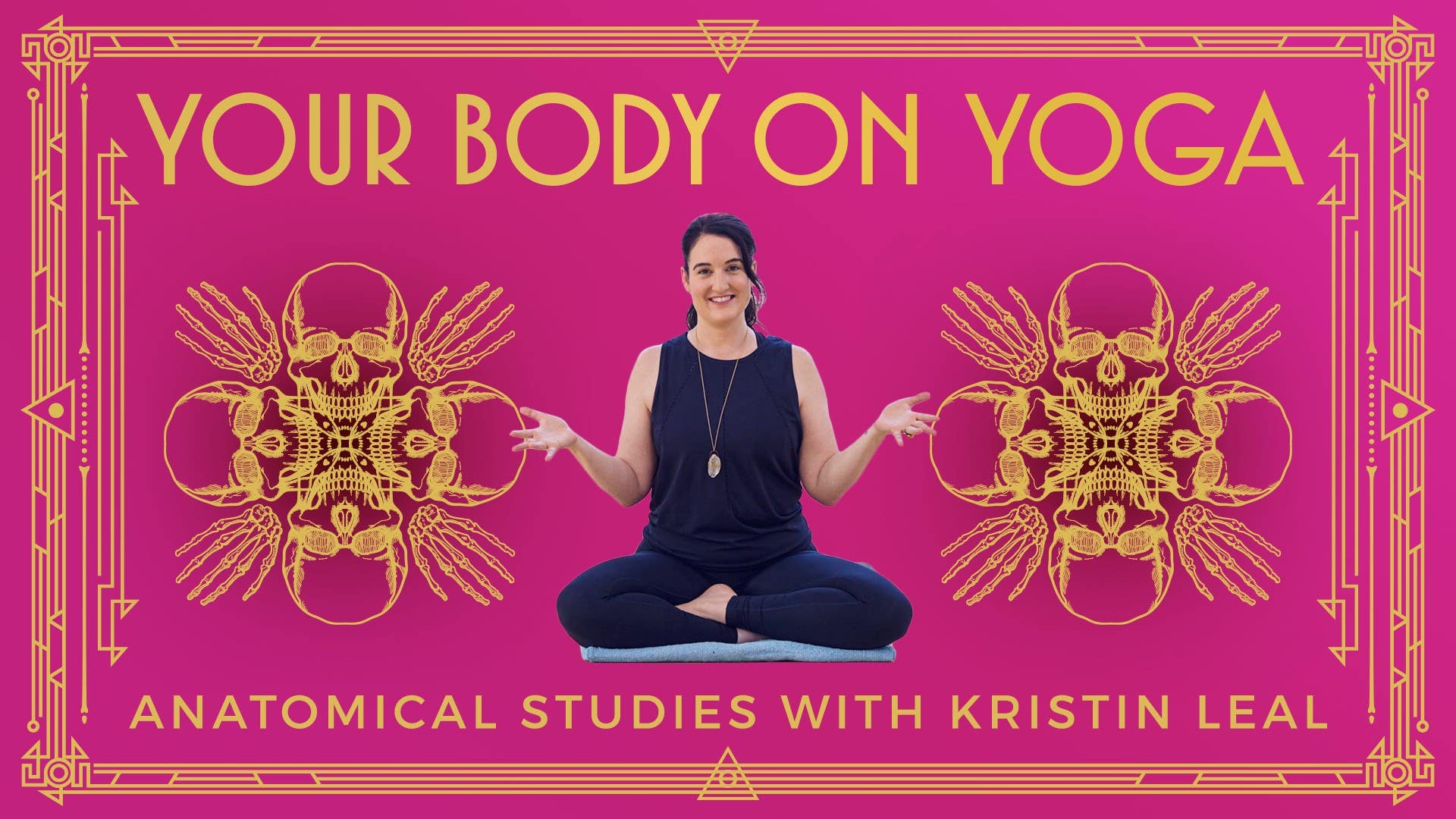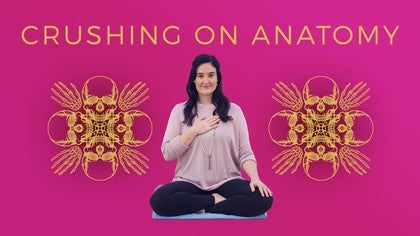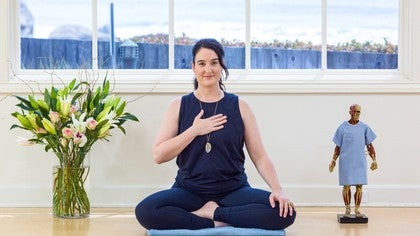Description
About This Video
Transcript
Read Full Transcript
When I first started studying anatomy, as well as when I first started studying yoga, I was interested in getting more knowledgeable, more answers. I wanted to know how things worked and I wanted just the information almost like I was hoarding the correct answers on a test, you know, I just wanted more info. And then I think as I've changed, the interest is different. Instead of wanting more answers, I just want more wonder, I want more curiosity, I want more to be more, my heart just blown open, my mind just blown open. And I think every time you study this at a deeper and deeper level, you get that gift.
I grew up in the dance world, I was a ballet dancer and I think that's where a lot of the body issues started. The body was never good enough, it was never thin enough, it was never, your extension was never long enough, it just, nothing was enough. And I think that set me up for, in my twenties and thirties even, just this feeling of not measuring up, you know. And I saw my body as almost an enemy instead of a friend. And through the study of yoga, as well as the study of anatomy, I think it's given me more awe, it's given me more peace.
I'm thankful for my thighs now that can hold me in chair pose, for as long as my teacher wants me in chair pose. I'm thankful for my breath, just my heart that is continuing to beat and beat and, and I just have more gratitude, the more I learn about how many blood cells are produced every second. I can't help but be just in awe of it. Yeah, my study of anatomy really changed my relationship to pain. I have, I'm also a massage therapist and I have lots of clients coming to me that say, well, my knee hurts, and then, oh, also my thigh, and then they come back the next week, well, my knee feels better but my hip is hurting, what do I do, and oh, well, my hip is better but my shoulders, and it's like they're chasing sensation, they're chasing pain, fix it, you know, to get to somehow some mystical part, point in our life where everything feels great, everything is awesome, whether it's in my life or in my body or my relationship, it's just all perfection.
And you know, I don't know, I don't think that exists. It might exist for a moment, a beautiful moment, but it's not something that's sustained, whether it's in a relationship or in your body or in your heart, you know, it's all change, it's all a revolving door of sensations. And so instead of looking to fix but to change your relationship to it, to see it as passing, to see it as ever shifting, to see it as connected, to not see it as a foe, and to see it as something you need to conquer or fix all the time. I do think a lot of us trick ourselves into thinking that we thrive on stress. I'm from New York, and there's many people in New York that are type A personalities and think that I have to just be busy, busy, busy, busy, busy, and achieve, achieve, achieve, achieve, achieve, and it really never ends.
I think Katie Silcox says on here, busy is not an emotion. Busy is an avoidance of an emotion, which I love, right? When we look at the nervous system and we look how we have evolved in our biochemistry to have oxytocin, this kind of neurohormone released at the tail end of our stress response, which compels us to reach out for others, reach out and be seen, be heard, be felt, be touched, be touched, right? And that is just endlessly, wildly fascinating to me that this is part of our DNA, this is part of how we've evolved to not isolate, to not be busy, busy, busy, busy, busy, but to have these moments of I see you, I hear you, I feel you, that this is needed, not just achievement. So when you're studying yourself, whether it's through the practice of yoga or the study of anatomy, you begin to see all the transients, right?
You see an ache and pain that ships, and morphs, moves on, comes. You see the transients of the breath, right, constant. You see the transients of your thoughts, your belief patterns, your holdings, your compensation. You see just the transients of all of it. And that leads you back to the recognition of the part of you that's not transient.
The part of you that is the observer, the witness, awareness, depending on your tradition, you might label it a different word. I think by connecting to that ever-present field of awareness that is not locked into my meat suit, but is permeating everything in this room, everything in this world, the death of my physical body becomes less terrifying. I think it's the bacteria. We house this teeny tiny microscopic millions of bacteria in our body, and it was something that was once thought of in the anatomy world as just not something that was studied and something that was just put aside. And now as they study it, they're learning that it has so much effect on how we interact with the world, how others perceive us, our propensity of getting some diseases like Parkinson's or schizophrenia even, and it's just fascinating that it's something that was so overlooked and even considered just so small, it turns out to be integral to our health.
So the nervous system is definitely the sexiest, right? The nervous system by far is just the wildest. The fact that you have 100 billion neurons in the brain that each have up to 10,000 little finger-like projections from them, and each one of those can connect to another one of those, and it's near infinite, and our brain can't even grasp our brain. It's just, it's wild, right? But the circulatory system, my goodness, this heart that has been beating, I'm 42 now, it has been beating since I was inside my mother, endless when I was happy, when I was on the floor in tears, when I was a hot mess, when I was in my most on moment.
It is just this constant throb in my body that I can feel and connect to at any moment. That's insane. The bones, the bones, I think sometimes we think that they're just kind of boring. We only see them in a Halloween decoration or something, but they're constantly remodeling. Every seven to 10 years, you have a whole new skeleton.
Think of where you were seven years ago, a whole new skeleton. And that promise of evolution, of change, of remodeling, of re-patterning, that's big. I love when I first get to teach this to a new group, a new person. They often come in with their experience of their anatomy in the past, a dry science teacher in college or high school, and they just want to memorize this weird language that's just really foreign. And why?
Why? And I love the look in their eyes when they turn on to how integral the study of you and all of its facets can be, how it can bleed into not just your yoga practice, but how you relate to people. And so my great hope that people that are taking this course with me just get their hearts open, their minds open, and learn, reconnect, it's not even really learning, just reconnecting, reuniting to how fantastic they are, that is my great hope for this course.
Your Body on Yoga: Introduction to Anatomy
Comments
You need to be a subscriber to post a comment.
Please Log In or Create an Account to start your free trial.



















